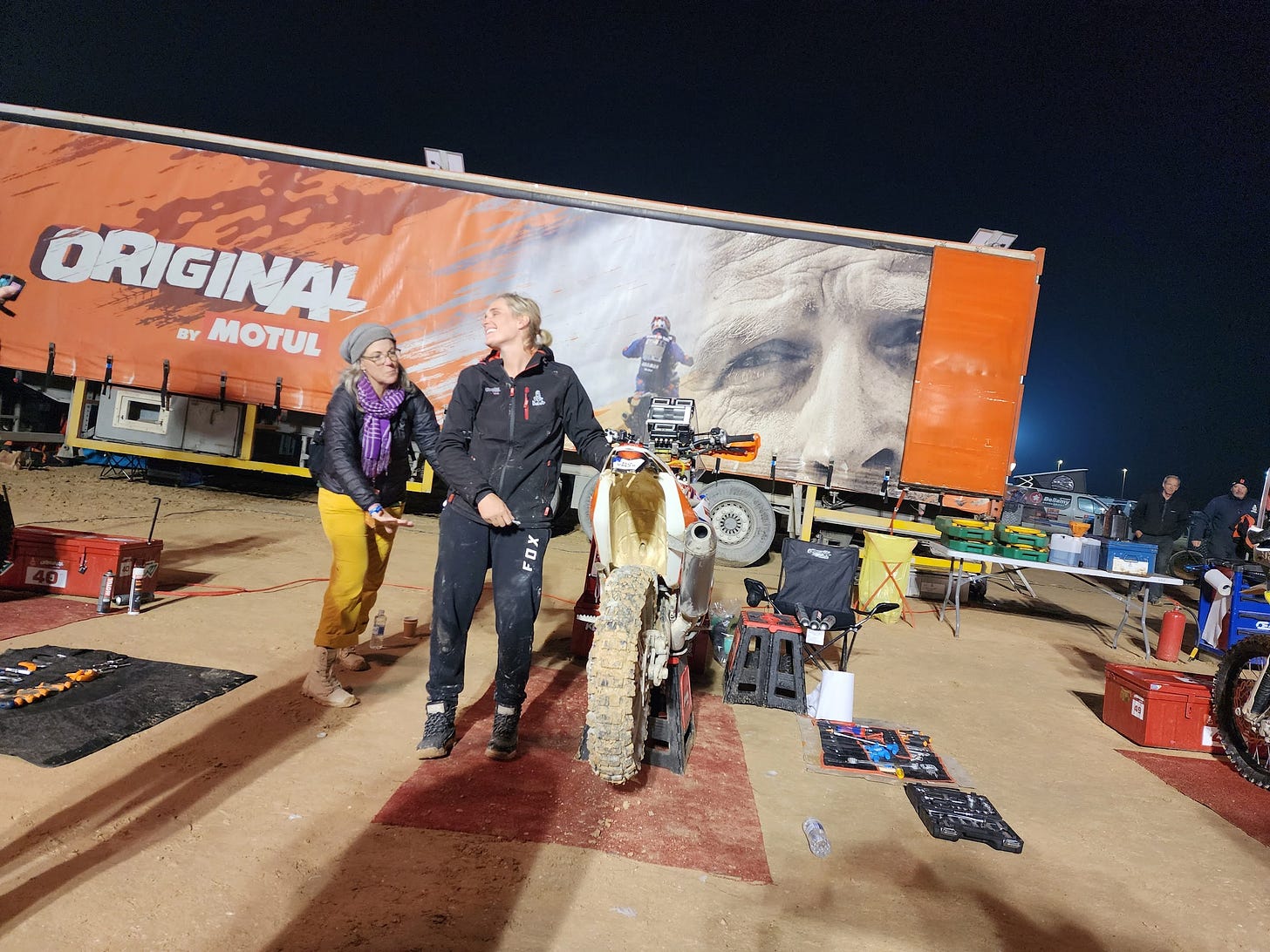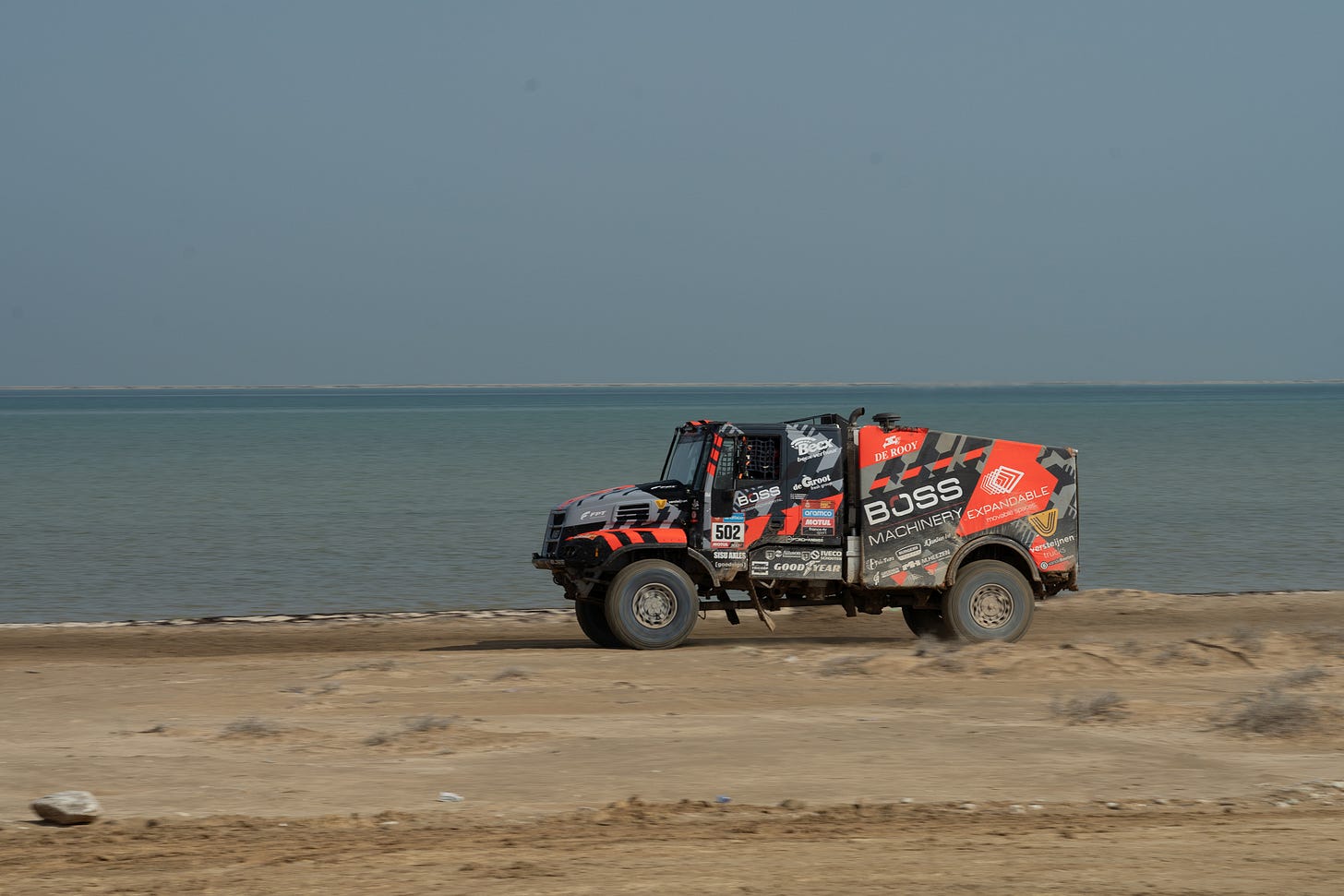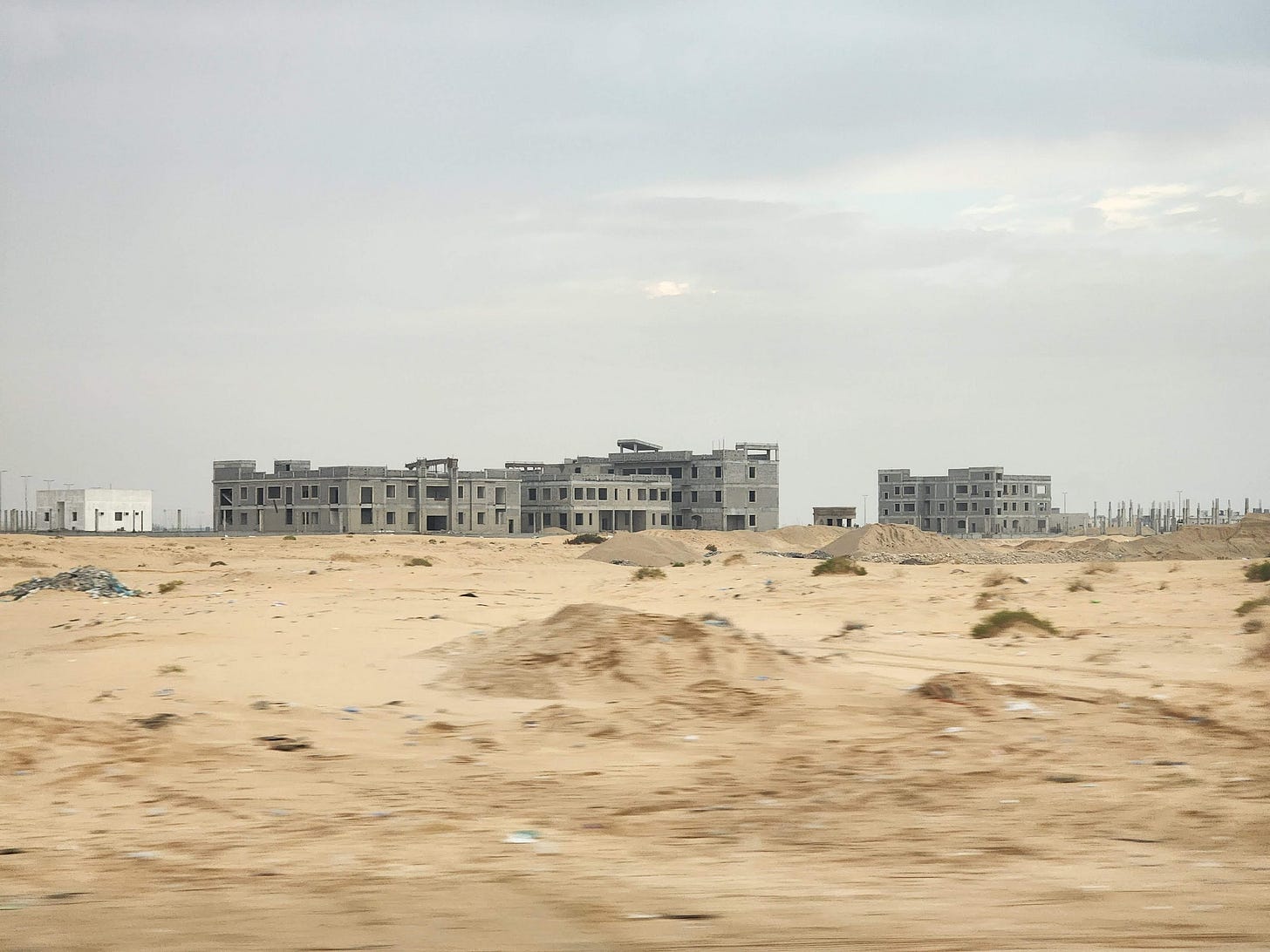Dakar, and the Shame of Being a Modern Motorsport Enthusiast
Thoughts on Saudi Arabia, Dakar, and the perspective-widening importance of travel.
I wasn't lucky enough to visit the Dakar Rally in its glory years, the years that began with a triumphant, flashy parade through the streets of Paris followed by thousands of grueling miles of misery across the African continent, ending when whatever broken machines and bruised drivers staggered into Dakar weeks later.
2023 marked the 45th running of the Dakar Rally. Looking back from a modern perspective, those earlier races were obviously simpler events in many ways, but I can't help feeling that being a fan was simpler then, too. I can't imagine many spectators were left with the sorts of mixed emotions that I find myself carrying as I stagger home from the Dakar Rally, now run in Saudi Arabia.
I've been watching the race religiously for decades, obsessing over whatever scraps of coverage I could find on Speedvision (RIP) or ESPN or YouTube or other, less savory means of acquisition. I confess I rarely bothered to read the results. If I couldn't watch it I ignored it, because for me Dakar was never much about who won. Instead, for me, it was about the individual journeys, the personal struggles, and the outrageous sights along the way. Call me a lightweight fan if you will, but to me the soul of Dakar is not captured on any timing sheet.
2023 would be the first time I was lucky enough to attend the race in person. Likewise, this would mark my first visit to Saudi Arabia. I've visited Qatar and Dubai and various other places in the Middle East so I thought I had a good idea to expect, but I came into this country with a bad taste in the back of my mouth. As a long-time Formula One fan, too, I'm increasingly used to swallowing that down, tuning that out, and enjoying the show.
With boots on the ground in Saudi Arabia, I found this was a lot harder to do.
Even entering the country was a challenge. Entering anywhere in the Middle East as a journalist is a fraught affair, even for someone such as myself who covers decidedly soft topics like cars that go fast and the pampered souls who drive them. Walking to the customs counter I'm always ready for stern questions, unkind looks, and a thorough examination of each of the stamps scattered through my very tired passport.
Entering Saudi, I'd thought a post-midnight arrival would mean an empty customs queue. Though I was first off my plane, I still found myself in line behind a dozen Saudi women, black-clad figures orbited by a galaxy of running and screaming kids, one with a sparkly hat that said "HAPPY BIRTHDAY." Clearly they were all coming down from an enviable sugar high. As I stood and waited for my turn, more and more women came bringing more and more children to the impromptu party, all of them cutting past me in line without so much as a nod of apology. So it goes. Tired as I was, the scene was so lovely I couldn't help but smile.
When my time came I was waved forward by a male customs agent who looked as exhausted as me after my 22 hours in transit. He took my passport and my printed visa and began the ceremonial aggressive page flipping that every customs officer must master before being deployed in the field. Three times he read every sheet then scowled at my visa, saying nothing. He then stood, handed both back to me, and started to walk away. When I asked if I was clear to enter, he made a shooing gesture back towards the line I'd just finally cleared. I was, at that point, merely an annoyance.
Five minutes later, a second agent occupied the seat that the first had just vacated. They waved me forward and the dance began again, flipping through my passport (somewhat less forcefully), pondering my visa, and then asking me something in Arabic. I apologized, but the agent clearly spoke as much of my language as I did of theirs -- which is to say none.
The agent then took me to another counter and talked to another agent, who took my passport.
"Where are you from," this new agent said, holding my passport that said "United States of America" on the front.
"Uh... the USA? America? New York?" I said. None of those could possibly be the right answer to this trick question. This was a test and clearly I'd failed.
The two conferred for a moment. The first agent walked me back to their desk then got up and walked away, just like the one before. One major difference this time: they still had my passport.
I started wondering which of the little side-rooms they were going to pull me into, which flight I was going to have to take back home, which horrible seat I'd be assigned on such short notice.
This agent returned before I’d run through all the eventualities, flipped open my passport, wrote something on a blank page with a ballpoint pen (I still have no idea what it says), then gave the all-important stamp. I was free to stagger onward to the blissful bed waiting for me somewhere in the early Saudi morning.
Over the next three days I was given an impression of a place absolutely perfect for an event like Dakar. The countryside is startlingly beautiful in places, a landscape swept in sand and dotted by otherworldly rock formations, crisscrossed by perfectly straight proto-highways actively being built around you and ultimately terminating with little warning, leaving anyone who would continue onward dropping to 4WD Low.
Even so, the highways aren't particularly notable. It's the omnipresent litter framing them that, for me, quickly established Saudi Arabia as perfect for Dakar. This is a gorgeous place where environmentalism is clearly an alien concept. Order a Pepsi (Coke is rare in the Middle East, dislike still lingering after opening an Israel bottling plant in the ‘60s) and it'll probably come to you in a can with a pull-tab of the sort banned 50 years ago in the US.
Plastic bottles are less dangerous to bare feet, but even more prevalent on the landscape. No matter how far we droned down those highways, the piles of refuse on the side of the road continued at a constant rate. Even going off-road miles into the desert, where the only buildings are the huts occupied by camel ranchers, barrels and plastic bottles poked through the sand in every direction.
On the way to visit a checkpoint 120 kilometers into stage 14 of the Dakar Rally, on the horizon we spotted what looked to be a giant gas fire, too wild to be any sort of refinery, spewing huge clouds of smoke into the air. Our local guide didn't know what had caused it. He didn't seem too bothered.
Again and again I was struck by the beauty of the place and the undeniable impact of what we're doing to it. An ever-increasing number of Dakar Rally teams talk up their purportedly green fuel sources, and I love them for it, but it all feels a bit disingenuous in the face of the giant, 20,000-pound trucks spewing black smoke into the air as they pound across the bottle-covered sand. Likewise, the compostable cutlery in the bivouac is an appreciated touch, but a minor one given the endless trash blown up against the fence surrounding the place.

On the eve of the final stage I stood in awe next to Kirsten Landman in the bivouac, the Malle Moto rider who survived thousands of miles unsupported, as she politely dealt with questions from fans and media despite looking ready to pass out. The next day, I was thrilled when I saw Toby Price go screaming by on stage 14, his KTM fishtailing wildly through the mud but hurtling its rider ever forward. I was dazzled by race-winner Nasser Al-Attiyah and the way his Toyota diced around the rocks on the shore. And I very thoroughly enjoyed the alien look and sound of Audi's RS Q E-Tron E2 as it screamed by. (Note: I wrote about that car's performance over here on Jalopnik.)
But it was the massive trucks that left me most conflicted. They didn't avoid the terrain so much as slam through it. The wrongness of something that huge moving that fast is what makes watching them so incredibly charming, but again the cloud of black smoke they leave behind, never mind the giant tracks on the earth, must give even the most timidly eco-conscious fan pause.
Tread lightly this is not.
And all that ignores the political situation. Saudi Arabia is a beautiful place full of warm and friendly people ruled by a government that only let women start driving in 2018 and punishes petty theft with limb removal. Likewise, it's a society with classes so well stratified you have to turn to HG Wells to find something more extreme. It's hard to feel very good about watching any event that takes place there. I suppose this should not have been a surprise, these are all things I knew before my passport got stamped, but it's even harder to ignore when visiting.
I don't really have a positive way to end this thing. In fact I've never really written anything like this so as usual I have no idea what I'm doing here in general, but I felt compelled to share how conflicted this trip made me feel. Still, it was a good trip. Not necessarily a good trip in the "Dude, that was 100% amazing," sort of way, but in the sense that it changed my perspective on things. That to me is what a good trip does.
Despite all that I’m still a fan, but I'll be watching Dakar a little differently next year. I’ll cheer a little harder for any team trying to evolve the storied event into something a little less detrimental on the very landscapes that it brings to the world's stage. As of today, it's hard to see Dakar's alt-fuel, carbon-neutral efforts as anything other than marketing, but I look forward to the day when this rally that celebrates nature becomes a little less detrimental to it.
(Full disclosure: I was in Saudi Arabia on a sponsored media trip, as is typical in the autos industry. You can read about that here on Jalopnik. Nobody paid me to or even asked me to write this. I was merely left with a lot of thoughts and now they’re yours, too. You’re welcome.)






Even going off-road miles into the deser(t),
Thanks for sharing Tim, it was a very well-written perspective. As a fan of English Premier League football, the concept of 'sportswashing' is becoming increasingly prevalent, and, at times, it's hard to tread the line between enjoying and supporting the sport you love, and trying to understand and address the darker side of success. I did notice a typo in the article, a minor missing letter, if you'd like to amend?